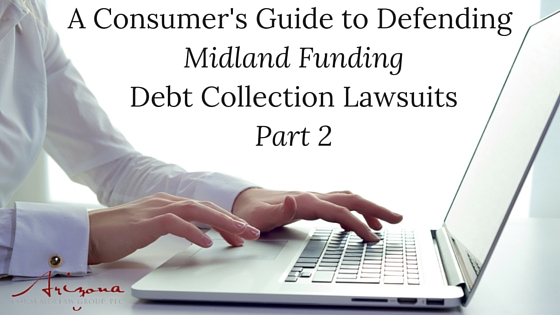Even though Midland Funding is a debt collector, its business model really isn’t about calling you on the phone or sending you threatening letters – they sue people. And they do so in huge numbers. In 2008 Midland filed more than 450,000 debt collection lawsuits around the country.
It is for this reason that I tell people I consult with in my law practice that if you pull a credit report and see that Midland Funding is showing up as one of your creditors you will likely be sued by them in the near future.
Should I Avoid Being Served by Midland Funding?
 Once Midland actually files its lawsuit against you it is then responsible to have you served with the lawsuit – which is usually made up of the summons and complaint.
Once Midland actually files its lawsuit against you it is then responsible to have you served with the lawsuit – which is usually made up of the summons and complaint.
Service of the lawsuit occurs when a process server, constable, or other authorized person brings a copy of the summons and complaint and gives them to you or someone else in your household. Once you are served with these documents the clock starts ticking for you to submit a written response (called an Answer) to the allegations in the complaint.
Often I will have consumers ask me if an effective strategy in fighting back against Midland is to avoid being served in the first place. The idea being that if they never serve you then they can never get a judgment. While I understand the idea behind this strategy I always tell my clients that this is not a good idea. He’s why –
Creditors like Midland are typically required to have a process server personally serve you. However, if they can’t find you are if the process server believes you are trying to avoid being served then Midland Funding can go back into the judge and get permission to serve you in some alternative method. For example they may allow them to mail the complaint and summons to you, or publish it in the legal notice section of a newspaper, or even to simply post the lawsuit to your front door.
The problem with service by an alternative method is that many times the person being served isn’t aware that it has actually happened. This is particularly true when a court authorizes Midland to serve you via publication. Unless you have a habit of reading the legal notice section of the newspaper (which would be weird) then it is highly unlikely that you would happen upon the complaint and summons that have been filed against you. And even though you don’t know that you were technically served the clock has started ticking and in many (if not most) cases you end up with a default judgment because you didn’t know you needed to file the written Answer.
You have many good defenses against a Midland Funding lawsuit. It is best to fight this battle head-on. Don’t avoid being served.
The Important First Steps to Take After Being Served with a Debt Collection Lawsuit
Over 90% of consumers sued by junk debt buyers like Midland Funding end up with a default judgment entered against them. Why? Because they failed to file an Answer in response to the allegations contained within the lawsuit.
That it why the first steps you take after being served with the complaint and summons are so critical to your success. After the process server drops off the complaint summons these are the first three steps you need to take:
Step 1 – Take a Deep Breath – You Are Going to Be Okay
Process servers often come by your home on weekends, or late at night or early in the morning. Having someone come by your home at a weird hour and drop off legal documents really feels like an invasion into your personal life. It is normal for you to be upset and emotional about being sued, but understand this – the allegations contained within Midland’s complaint are just that – allegations.
There is no need to panic. The court system is set up to allow both sides to present their side of the case before any final decision is reached and you will get your opportunity.
Step 2 – Get Out a Calendar and Write Down the Date You Were Served
 Once you are served with the lawsuit the Rules of Civil procedure for your state set a deadline for you to file your written Answer. This information will be included in the summons that you received with the complaint. In most states you will have 20 – 30 days to file your Answer.
Once you are served with the lawsuit the Rules of Civil procedure for your state set a deadline for you to file your written Answer. This information will be included in the summons that you received with the complaint. In most states you will have 20 – 30 days to file your Answer.
Read the summons and find out when how many days you have to respond to the lawsuit. Take out your calendar, and calculate out when your Answer is due. In most states if you are even one day late it can cause big problems for your case and may eliminate your ability to contest the allegations, resulting in a judgment against you. Write it down.
Step 3 – Prepare to Draft the Answer
 The Answer is actually one of the least complicated documents you will need to prepare when it comes to responding to a Midland Funding lawsuit. The biggest mistake I see people make when they draft their own Answer is that they use the Answer as a platform to “tell their side of the story”.
The Answer is actually one of the least complicated documents you will need to prepare when it comes to responding to a Midland Funding lawsuit. The biggest mistake I see people make when they draft their own Answer is that they use the Answer as a platform to “tell their side of the story”.
You will get a chance to tell your side, but the Answer is not the place to do it. And in fact, by doing so many people actually harm their case.
The Answer is not the time to tell the court how you ran into hard times, or lost your job, or suffered a serious medical condition that made it so you couldn’t pay your debts. Likewise you shouldn’t go into how you may have tried to settle this debt years ago but the creditor was not reasonable.
All of that may play a role in your case down the road, but for now all you need to focus on is directly responding to the allegations contained within the complaint. And this can typically be done by responding to each of the numbered paragraphs with one of three Answers –
Admit. Deny. I don’t know.
That is really all there is to it. The court wants to know whether you admit or deny the allegations of the complaint or if you simply don’t have enough information at this point so you simply don’t know.
In the next part I will discuss the key components to drafting an Answer.
Looking to Get Started on Your Answer?
Check out my online video course that walks you step-by-step through the process. Click HERE to learn more about my course “How to Draft an Answer to a Debt Collection Lawsuit.”
Schedule a Free Consultation!
 John Skiba, Esq.
John Skiba, Esq.
We offer a free consultation to discuss your debt problem and help you put together a game plan to eliminate your debt once and for all. Give us a call at (480) 420-4028

